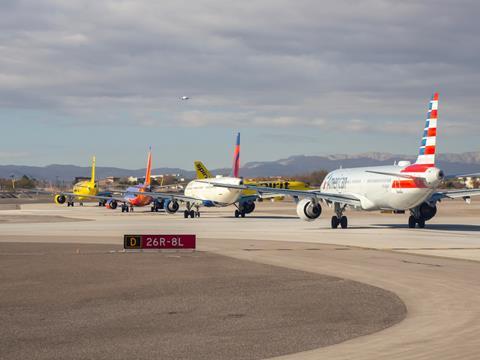The US Senate on 24 October unanimously confirmed Michael Whitaker as administrator of the Federal Aviation Administration, ending an 18-month period of uncertainty regarding the agency’s long-term leadership.
The FAA has been without a permanent leader since former administrator Steve Dickson left the job in March 2022.
The confirmation progressed relatively quickly following Whitaker’s nomination by President Joe Biden last month. (Under US law, presidential nominees must be approved by Congress.)

Biden’s previous nominee, Phil Washington, withdrew his nomination amid criticism from Republican lawmakers following his confirmation hearing in March. Longtime US transportation official Polly Trottenberg has been serving as acting administrator since June, when she replaced former acting administrator Billy Nolen.
Trottenberg had been due to step down from the FAA’s top spot by 25 October in accordance with laws governing presidential nominees.
Whitaker begins a five-year term during which he will be tasked with addressing near-misses at US airports that have recently threatened to result in catastrophic aircraft collisions, integrating entirely new classes of aircraft into an already-congested National Airspace System and managing the FAA’s so-called NextGen effort to modernise air traffic control.
“Mike has earned broad bipartisan support because it’s clear he has the expertise and disposition to successfully lead the agency from day one,” says US transportation secretary Pete Buttigieg. He adds that Whitaker is taking the job at “pivotal time for the FAA”.
“The national airspace is busier and more complex than ever, and the challenges are many, from addressing serious close call incidents that have put the entire aviation community on notice, to the need to keep up the FAA’s momentum on air traffic control hiring and training, to continuing to be creative and collaborative with airlines to keep cancellations low after the spike in disruptions last summer,” Buttigieg says.
Whitaker worked as deputy administrator of the FAA from 2013-2016, and as senior vice-president for alliances, international and regulatory affairs at United Airlines prior to that.
More recently, he has held the role of chief operating officer of air taxi developer Supernal, a subsidiary of Hyundai Motor Group. His ties to the advanced air mobility sector are seen by some as a sign of the FAA’s growing familiarity with electric vertical take-off and landing (eVTOL) aircraft.
US air taxi developer Archer Aviation said that Whitaker’s “experience working across the traditional aviation and eVTOL aircraft industries signals a recognition that our country is poised to lead the commercialisation of advanced air mobility”.
”The United States leads the world in aviation safety, innovation and regulation, and this confirmation will provide the strong and steady leadership to ensure that continues,” adds air taxi start-up Joby Aviation.
Whitaker’s appointment generally drew praise from pilots’ unions and airline groups, which expressed optimism that he can help the FAA solve its infrastructure problems – and also recognised the difficulty of the tasks ahead.
US airline trade organisation Airlines for America said the challenges facing the regulator “underscore why steady, permanent leadership at the agency is necessary, especially given the anticipated growth in demand for passenger and air cargo transportation”.
Last month, United said that Whitaker “has deep aviation expertise and a solid reputation as a problem solver”, and the Regional Airline Association’s CEO Faye Malarkey Black said Whitaker is the “kind of roll-up-your-sleeves leader that the FAA needs”.
“This is a critical moment for American aviation, and throughout his confirmation process, Michael has displayed a strong commitment to safety and the importance of having two highly trained pilots on the flight deck,” says major pilots’ union Air Line Pilots Association, International (ALPA).
ALPA has used Whitaker’s appointment to advocate for maintaining existing pilot-training rules. The union has been battling efforts to loosen a rule requiring most new US airline pilots to have 1,500h of flight experience.
The Senate is currently considering a bill that would fund the FAA for five years after the agency’s current spending authority expires in November. It would also raise the pilot retirement age to 67, and push the FAA to hire more air traffic controllers. The lower chamber of Congress passed the bill on 20 July.


























